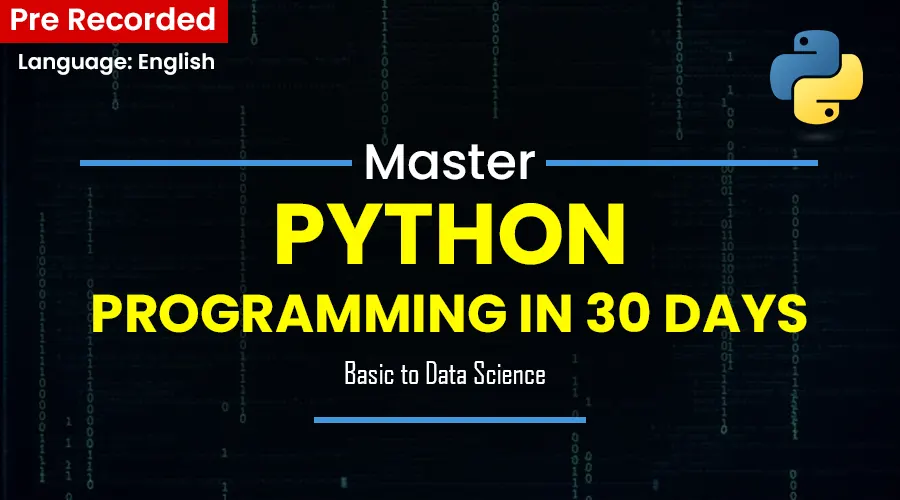Course Title: Mastering Python Programming – From Basics to Data Science
Syllabus:
Module 1: Python Fundamentals
-
Introduction to Python
-
History and evolution of Python
-
Features and real-world applications
-
-
Installation of Python
-
Installing Python on various OS
-
Setting up environment variables
-
Installing IDEs (PyCharm, VS Code)
-
-
Jupyter Notebook Overview
-
Installing Jupyter
-
Using cells, markdown, and basic operations
-
Code execution and visualization
-
-
Variables, Keywords and Comments
-
Declaring and initializing variables
-
Python keywords and naming conventions
-
Writing comments and docstrings
-
-
Operators in Python
-
Arithmetic, relational, logical, bitwise, assignment, and special operators
-
Operator precedence
-
-
How to Take Input from User
-
input()andprint()functions -
Formatting output using
format()and f-strings
-
Module 2: Control Flow and Data Types
-
Conditional Statements
-
if,else,elif -
Nested conditions and shorthand syntax
-
-
Looping Statements
-
for,whileloops -
break,continue, andpassstatements
-
-
Data Types in Python
-
Numbers, strings, lists, tuples, dictionaries, and sets
-
Type casting and type checking
-
Module 3: Functions and OOPs
-
Functions in Python
-
Defining and calling functions
-
Arguments, return values, and scope
-
*argsand**kwargs
-
-
Lambda Functions
-
Syntax and use cases
-
Anonymous functions in Pythonic code
-
-
Decorators and Generators
-
Writing and applying decorators
-
yield,next()for generator functions
-
-
Classes and Objects
-
Basics of OOP
-
__init__()method and instance variables
-
-
OOPS Concept
-
Inheritance, polymorphism, encapsulation, and abstraction
-
Method overriding and super()
-
Module 4: File and Error Handling
-
File Handling and Exception Handling
-
Reading and writing files
-
File modes and context manager (
with) -
try,except,finally,raise, and custom exceptions
-
-
Regular Expressions
-
remodule -
Pattern matching, searching, and replacing
-
-
Logging and Debugging in Python
-
Using
loggingmodule -
Setting log levels
-
Debugging techniques
-
-
Python Testing
-
Unit testing with
unittest -
Writing test cases and test suites
-
-
Command Line Arguments
-
Using
sys.argv -
argparsemodule for advanced parsing
-
Module 5: Advanced Python and Data Science
-
Databases in Python
-
Connecting with SQLite and MySQL
-
Executing queries using Python
-
-
API Development in Python
-
Basics of REST APIs
-
Using Flask to build simple APIs
-
-
Pydantic (Data Validation Framework)
-
Data models and schema validation
-
Type hints and data parsing
-
-
Python Libraries for Data Science
-
Overview of NumPy, Pandas, Matplotlib, Seaborn
-
Basic operations and data visualization
-
-
End to End Project on Data Science
-
Project problem statement
-
Data preprocessing, analysis, modeling, and visualization
-
Model evaluation and final report
-
-
Important Concepts That Everyone Should Know
-
Best practices in Python
-
Code optimization and readability
-
Preparing for interviews and real-world applications
-




